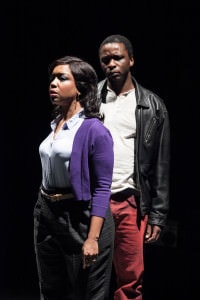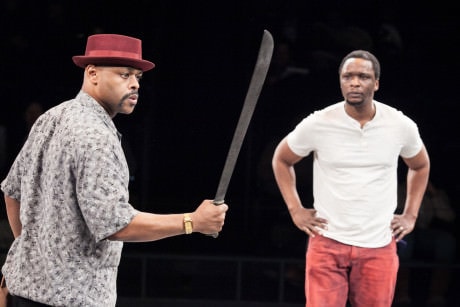Make no mistake about it. August Wilson is one of America’s greatest dramatists. Authentic, historically rich, and dramatically insightful — few playwrights have the gifts and the talent to create work that resonates with all three qualities.

Arena Stage’s new production of King Hedley II, the 1980’s representative of his century long Pittsburg Cycle, is a power-packed punch to the midsection. You will stand up clear headed but emotionally wrought and ready to re-think the world.
Wilson’s King Hedley II does not turn away from its working class African American roots. It does not sugarcoat its exploration of that experience with easy, politically correct “truths” that later ring hollow. It does not blame its tragic potential on a too-powerful White Other, though such an Other clearly casts its shadow over its concrete world. It does not stamp its implication with definitive solutions, even as that yearning screams for fulfillment.
What it does offer its audience is six beautiful, if flawed, characters looking so much like life itself that empathy can’t help but take its hold on you. You will hear every word they utter, feel every cry they growl, know every hope to which they aspire.
And the rage–yes, there will be rage, mountains of it, and it will be a rage born in that dream deferred, but not interred. Like the flowers that squeeze through the concrete’s cracks, these dreams will not be denied, only stomped and smacked.
King Hedley II is a drama planted in the violence of the 1980s. The Cold War winding down, guns flooded the country’s urban centers; and, as a result, violent crime, drive-bys, armed robberies, and homicides spiked.
A 30-something King, played with intense determination by Bowman Wright, has gotten out of jail, gotten himself a job, gotten married, and is now fixated on buying himself a video store so that his new wife and their soon-to-be first child will have a piece of the American Dream.
Wright’s King is the storm around which all the other storms swirl. His hurricane of desire, a desire that cannot be contained, becomes the gold-standard by which all desires are then judged.
Wright’s performance is brilliant. He pulls the audience in with his authenticity and passion and boundlessness.
King’s mother, Ruby, is played by E. Faye Butler, an actress well known to Washington audiences. She delivers a visceral, complex portrayal of a mother who has seen it all but still can’t resist wanting more, until she suffers yet more. She is all no nonsense until she isn’t.
King’s best friend, Mister, played by Kenyatta Rogers, is another Washington favorite. Easy-going and always ready to be a second to King’s sparkling ambitions, Rogers captures the plight of all working class men. Stuck in an economic system that makes daily living as bad as Camus’s “Sisyphus,” his Mister pushes his rock daily to the hill’s almost top only to watch it roll back down again; then, he makes his own bad choices in a universe in which there are few others to make.
King’s wife is played by the fiery Jessica Frances Dukes. Her Tonya provides the counterpoint to King’s more materialistic notion of success. She wants more than anything — not to have a nice house or a nice car or a nice new dress — but for her child to have a father; and she is willing to place her whole life on the line to realize it.
Then, we have King’s nemesis, Elmore, played suavely by Michael Anthony Williams. The 66-year-old Elmore has conquered the street with a combination of smarts, trickery, and the occasional deadly behavior. In his world, in the final analysis, it is every person for him or herself; but he knows how to win the heart and fool the mind of everyone he meets.
Finally, we have Stool Pigeon, the unattached prophet of this play who spouts about fate and its ravages. As played by André de Shields, Stool Pigeon bops around the stage offering a combination of Old Testament vision, Vodun mysticism, and Streetwise “God’s a motherfucker” wisdom.
Timothy Douglas makes his Arena Stage directorial debut with King Hedley II, and he does so masterfully. Wilson’s intensity is not easy; his rich, poetic language and consuming monologues can slip into monotony, but Douglas keeps both intensity and language varied and multifaceted, a combination of day-to-day chit and chat with modern day soliloquy.

The production team has also turned in a first rate job.
Led by designer Tony Cisek’s concrete boxing rink of a set — you will find no padded landings here in the Hill District of Pittsburgh when you get knocked on your ass.
Lighting Designer Allen Lee Hughes has created the perfect ritualistic effect, highlighting the central playing space while allowing the always present ensemble to sit just out of focus.
Finally, Ilona’s Somogyi’s costume design is appropriate yet semiotic. When Ruby enters near play’s end in her simple yet red flaming dress, a sense of foreboding enters with her. She’s no burning bush but yet portentous she surely is.
The original music and sound design by Ryan Rumery only adds to the production’s ritual of heartbreak.
And that driving sense of heartbreak lies at the center of King Hedley’s power. We sense the tragic with every breath, not because these characters are addicted to bad behavior, for surely they strive mightily to alter their life narratives, but because their world is condemned.
Thirty years later — with the economic divide between the haves and the have-nots wider than ever, with even more guns on the streets (in fact, the Supreme Court has opened the floodgates with virtually no gun regulations allowed), with the only jobs being created being part-time and for low wages, with police militarization and incidents of police-related killings seemingly on the rise monthly — who can say King’s situation would be any better today.
The working class population, and the working class African American population in particular, sees its dreams threatened as never before.
Wilson’s King Hedley II represents the finest of American drama, because it captures the spirit of America in ways that only a great artist can capture.
True, the characters it offers are probably not like the people who attend most theatre these days, but its characters are like most Americans: they get up every morning and struggle to make ends meet and to avoid the daily pitfalls of violence and scams.
And, most of all, they dream of a better life for themselves and their children.
Go see King Hedley and imagine yourself.
Running Time: 3 hours with a 15-minute intermission.
King Hedley II plays through March 8, 2015 at Arena Stage at The Mead Center for American Theater – 1101 6th St SW, in Washington, DC. For tickets, call the box office at (202) 488-3300, or purchase them online.
RATING:




